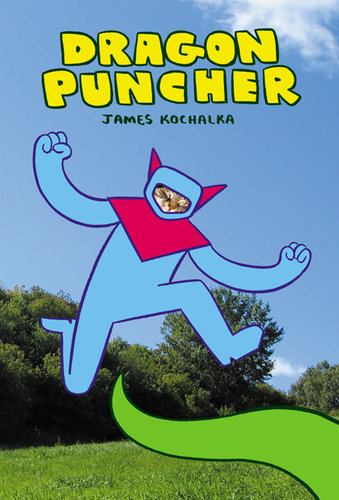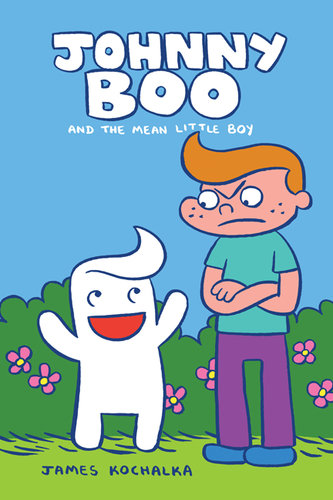

Johnny Boo and the Mean Little Boy, James Kochalka
Dragon Puncher, James Kochalka
There’s really no doubt that one of the things that has always been admirable about Kochalka‘s work is the joyously childlike spirit inherent in it — whether that be the subject matter of many of his earlier graphic novels, the lyrics to his songs, or even the ease with which he has collaborated with his young children on drawings for his autobiographical comic, American Elf. From drawings to dialogue, it’s not difficult to imagine his work appealing to children.
However, it wasn’t until these came in the mail that I’d ever really read something of his that felt geared particularly toward children — as if he were writing to them and simply allowing adults in on some of the jokes, instead of vice versa. And of course, that’s what he’s doing — most particularly, he’s writing to his own boys, having indicated in other interviews that he develops these books chapter by chapter using them as his focus group. It’s a good choice, and one I’m sure used by many children’s authors, but I don’t think many authors listen as closely to what their kids say in return as he does.
The one thing that really individualizes his work when compared to other children’s literature is the way he tells his stories — it sounds, really, like a story would coming from another child. The way it wanders without paying much attention to linear structure, the random insults and back and forth between characters — if you’ve ever listened to a five year-old making up adventures with their toys or while they drew on blank paper, it feels very familiar. For an adult to be able to capture that so perfectly is really impressive.
 And he even manages to do so while supporting a gently-stated message in each book — in Johnny Boo (the latest in a series featuring this character) talking about friendship and loyalty; in Dragon Puncher focusing on accepting help when it’s needed. None of the characters have to come out and say these things, any more than a child can ever really articulate the moral lessons s/he’s learning — but they sink in all the same.
And he even manages to do so while supporting a gently-stated message in each book — in Johnny Boo (the latest in a series featuring this character) talking about friendship and loyalty; in Dragon Puncher focusing on accepting help when it’s needed. None of the characters have to come out and say these things, any more than a child can ever really articulate the moral lessons s/he’s learning — but they sink in all the same.
If there’s any criticism I’d make of these books at all, it might just be a question as to the style chosen for Dragon Puncher. While the other book was fully hand-drawn, this one uses actual photographs of James, his son Eli, and their cat Spandy inserted into the pages as the faces of the otherwise-cartoonish characters, even making a point at the end of introducing them as the cast of performers playing these characters. While it’s an interesting and amusing style, knowing who those people are makes it oddly personal, like we’re listening in on someone else’s bedtime story. It might make it a little difficult for your children to see themselves in the tale — although it might also inspire them to create their own.
Both books are well put together, with hard covers and sturdy pages that should allow these to last a while. The cover price on each is $9.95, which seems about fair. I’d definitely suggest trying one of these books on your kids — and maybe stocking up on blank paper and crayons at the same time for their own storytelling.










